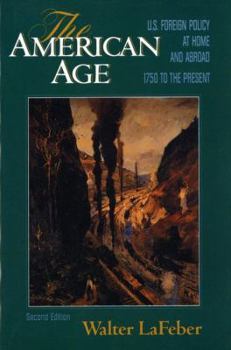The American Age: U.S. Foreign Policy at Home and Abroad
Select Format
Select Condition 
Book Overview
In this leading text, Walter LaFeber offers a comprehensive history of American foreign relations from the mid-eighteenth century to the present. His narrative account features several major themes:... This description may be from another edition of this product.
Format:Paperback
Language:English
ISBN:0393964744
ISBN13:9780393964745
Release Date:February 1994
Publisher:W. W. Norton & Company
Length:864 Pages
Weight:2.38 lbs.
Dimensions:1.3" x 6.2" x 9.2"
Customer Reviews
5 ratings
Great Book
Published by Thriftbooks.com User , 15 years ago
Great book. LaFeber is a great guy. I am Computer Science major, but I am now contemplating on doing policy!
La Feber delves into U.S. Foreign Policy
Published by Thriftbooks.com User , 15 years ago
La Feber is a very good historian who examines the diplomatic history of the United States from its beginnings into the late 20th Century. The book delves into the issues of the foreign policy of the United States and the people who conducted the policy. One of the more interesting chapters in the book is where La Feber looks into John Quicy Adams (who La Feber believes is the greatest Secretary of State of all-time). The chapter looks at one of the seemingly forgotten statesmen who did many great things for the young United States. The book is a very good general look at the foreign policy of the United States a must have for those Americanist who enjoy foreign policy. La Feber also does a good job weaving the domestic policy of the United States into the reasoning and the decisions make in foreign policy.
A Tour de Force of American Foriegn Policy
Published by Thriftbooks.com User , 19 years ago
Walter LaFeber's masterwork, this text is a detailed, high-impact summation of American foriegn policy throughout our history. What truly makes the book stand out, however, is the fact that LaFeber evaluates foriegn policy with democratic ideals in mind. Rather than plunging off the deep end of ultraliberal America-hating, LaFeber evenhandedly doles out praise and criticism to foriegn policy actors depending only on which is deserved. And as is too often NOT the case with history books, LaFeber also aviods the pitfalls of taking in too broad a sweep of subjects. Despite America's great strength, LaFeber does not pretend we are omnipotent or that our attitudes and values define the whole world's. Rather, events and actions that have the most impact on people and their lives are camly and deliberatly traced, described, and evaluated. Also to his credit, the author introduces the myriad of characters, places and ideologies that the topic demands be addressed with dashing flair and memorable phrase. While the vastness of World War Two quite nearly bests him, LaFeber, with determination and thorough scholarship, manages to write altogether servicable chaptes on the immense conflict. One wishes only for another edition, so that the same steady hand of diligent scholarship might come to balance and explain the too-tumultuous happenings of our late era. As a former foriegn policy student, I urge other students to keep the book after the class you use it for ends. LaFeber's worth and insight will likely long continue, and the perspective he provides will help anyone better understand the current foriegn policy mess we're in, and what our priorities should be.
Great resource for the analysis of US foreign policy
Published by Thriftbooks.com User , 24 years ago
I had this as a textbook for my foreign policy and decision making class last fall and found it to be a great book on the history of US foreign policy. It starts at the very roots of the history of the United States and continues to the present day, giving numerous examples of policy decisions. The book is laden with numerous political cartoons and even anecdotes from popular culture (including movies), to show how America's view of itself on both the international and national view has changed over the decades. Lafeber does not write in stilted jargon that only a true blue political science/international relations major can comprehend. This book is written in a professional yet enjoyable manner that does not get overtly dull. Read it for a good intro to America's foreign policy dillemas.
An Outstanding Account of the Development of U.S. F.P.
Published by Thriftbooks.com User , 27 years ago
It was with great anticipation that I began reading Walter Lafeber's The American Age. After reading his Inevitable Revolutions, I instantly became a fan of his writings. In The American Age, LaFeber takes the issue of U.S. Foreign Policy and systematically analyses it with great clarity and focus. He has made effective use of primary sources throughout the piece and has clearly shown the different veins of U.S Foreign Policy that have arised, from the evasion of military alliances of the Washington Period, to Taft's Dollar Diplomacy. I felt that the usage of editorial cartoons throughout the text was an excellent idea, as it allowed the reader to have a sense of the public mood during the era in question. In sum, I would declare that The American Age is a must for any reader interested in American Foreign Policy, not only as a reliable guide for facts and figures but also for a thoroughly enjoyable read




